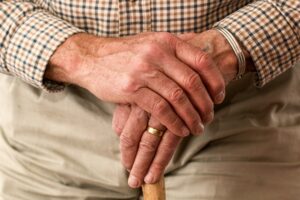By Peg Lopata, Contributing Writer

REGION – Are jars getting tighter? What’s happening?
Not so handy anymore? If you find yourself feeling pain or stiffness in your hands, it could be osteoarthritis, the most common type of arthritis. Joint cartilage coverings on the ends of the bones throughout your hands could be wearing thin. This leads to less muscle mass which over time diminishes strength.
Dr. Erika McPhee, orthopedic hand and upper extremity surgeon at Tufts Medical Center in Boston explained. “With time, the cartilage surfaces of the joints thin and the bones change shape which further contribute to stiffness,” she said. “The deformities that develop can affect the hand’s ability to grip objects. The muscles are not able to assist the joint in the same way as the joints lose their shape and mobility. All these factors contribute to loss of strength and function.”
Opening jars may be especially difficult because your thumb may not be as strong as it used to be. “Arthritis affecting the joints at the base of the thumb is particularly common,” said McPhee.
Keeping your hands strong

Photo/Submitted
According to McPhee, exercises to keep your hands strong could help slow the decline of strength and improve flexibility. You can’t build back cartilage, but you can keep the soft tissues in the joints supple.
The how-to is different for each person. Everyone is dealt a different hand and uses their hands differently. No matter who you are though, it’s important to keep those hands moving. But specific hand exercising? That depends on the usual stuff you do with and the condition of your hands.
“I believe that every hand is different,” McPhee stated. “Even with very similar x-rays, some people find certain activities aggravating, while other people might find the same activities helpful to maintain strength. There are some people who do so much with their hands that much more would be unnecessary―it could contribute to overuse conditions.”
There are even some exercises to avoid. For example, squeezing a ball can irritate joints.
Getting help
If your hands are not as strong as you’d like them to be, a visit to a health care provider may be a good idea. They can look at what will work for what you want to be able to do with your hands. Hopefully, they’ll take into account your whole body and what you do with it. If your hands hurt, they can address that too.
“The treatment plans I develop with patients are meant to take more than just their hands into account,” said McPhee. “If activities such as golf or tennis bring somebody joy and helps contribute to their cardiovascular health, I would rather take additional steps to manage their arthritis so they can participate in the sports they love. But in general, an active hand fares better in the world of arthritis over a sedentary hand. And I advise everyone to maintain a healthy, active lifestyle. It’s good for the entire body including the hands.”
One important rule to remember when exercising is that pain is a no-no. McPhee says listen to your body. That’s vital to prevent overuse and injuries. And don’t assume once you’re at so-and-so age your hands are tied.
McPhee added, “Age is just a number. I have 90-year-old patients with better-looking hands than some 40-year-olds.”
Keep your hands pain-free, strong and flexible and maybe you’ll be the one that opens the jar nobody else can.
Want some exercises for your hands?
www.aarp.org/health/conditions-treatments/info-2021/exercises-prevent-arthritis
www.webmd.com/osteoarthritis/ss/slideshow-hand-finger-exercises
www.aarp.org/health/conditions-treatments/info-2020/hand-strength
RELATED CONTENT:
Proper care can literally help save your skin (fiftyplusadvocate.com)
Regular exams are a key step in maintaining eye health (fiftyplusadvocate.com)
For healthy feet, take care of your overall well-being (fiftyplusadvocate.com)












